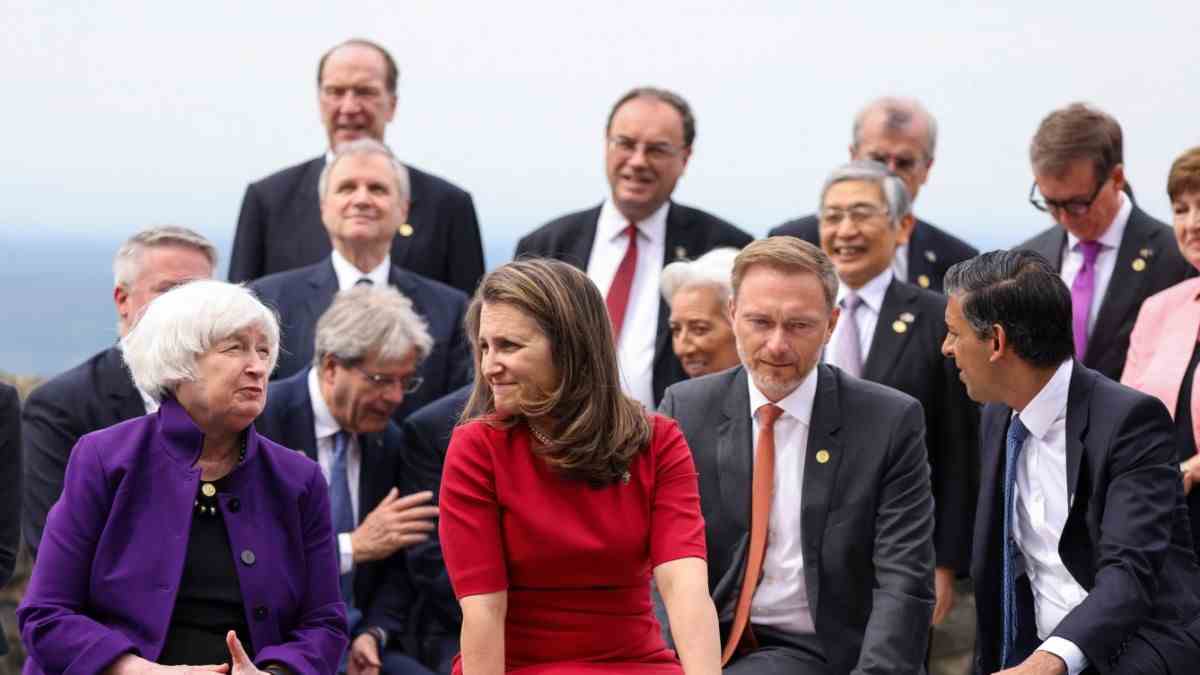When there is a brief pause between two limousines driving up, the waiting journalists ask the minister how he likes it on the Petersberg. “What can I say,” answers Christian Lindner smugly, “I’m the lessor.” After all, the former guest house of the federal government is still federal property, and of course it is “excellent” up here, “only leased a little too cheaply in view of the market situation”.
My grand hotel, my red carpet, my G-7 meeting: Lindner clearly enjoys his role on this Thursday morning. The finance ministers and central bank governors of the seven most important industrialized countries have traveled to the Rhineland, and he is the host. It all started on Wednesday evening with a dinner in Bonn, now the heavy cars roll up every minute. As head of the FDP, Lindner had to concede the third botched state election in a row last weekend, but as finance minister he is on top that day.
With Bundesbank President Joachim Nagel standing next to him, he shakes hands, greets in English and German and, in the case of Christine Lagarde, the French President of the European Central Bank, kisses left, kisses right. The central bankers drive up, the finance ministers come on foot; they are housed right up here, in Lindner’s federal property with a view of the Rhine.
Janet Yellen, the US Secretary of the Treasury, comes last. With clicking heels she walks towards Lindner, past the rhododendron bushes, which are just as purple as her jacket. For Lindner she is a special guest. Also because the USA is the only country at this point that has already made a commitment to Lindner’s central project of this meeting: A 15 billion euro aid package for Ukraine is to be put together, with America contributing 7.5 billion dollars.
Lindner has to convince colleagues to help Ukraine
Before shaking hands, Lindner once again made it clear what it was all about. “We have to ensure international financial stability, especially in times of inflation,” he said early in the morning, which in itself would be enough of a task. But of course there is still the war in Ukraine, which is why the German hosts have to do one thing above all: get their colleagues to give money for the aid package.
Ukraine had asked for the 15 billion four weeks ago in order to be able to maintain state operations despite the economic downturn caused by the war. On Thursday, Ukrainian Prime Minister Denys Shmyhal was due to be switched to the G-7 round to emphasize the urgency. And Lindner wants to deliver. Ukraine is fighting for peace and freedom with “impressive bravery” and defending the values of liberal democracy. “For this reason,” said the minister, “we see it as our joint responsibility to ensure Ukraine’s financial capacity to act at this moment.”
At noon, the ministers and central bank heads drape themselves around a lying “G 7” on the hotel terrace for the usual family photo. The Rhine flows past below, while above Lindner is evidently chatting animatedly with his British colleague Rishi Sunak. Only when the photographers shout “Everyone look up” does he briefly interrupt his conversation and look at the cameras.
In Berlin, the budget politicians sit down at this point. The adjustment session is coming up, the final fiddling together of the federal budget, which usually lasts until the early morning. The German share of the billion-dollar package for Ukraine must also be entered, almost in real time, from Petersberg to the Paul-Löbe-Haus.
Shortly before 4 p.m. in the afternoon, the minister finally reported completion. Not for the entire package, but that Germany will give one billion euros is now certain. In front of the blue G-7 wall, on the other side of the red carpet, Lindner then says that he expects further progress over the course of the day. Then he’s gone again. The minister is busy.

